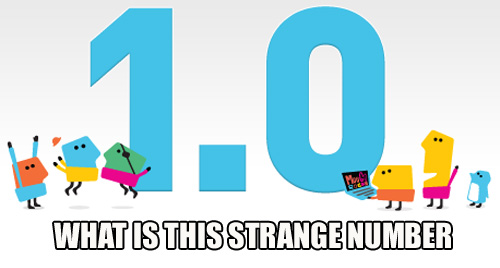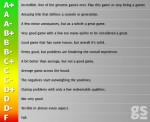Reviews are important. They help us ascertain what games are worth playing amid all the marketing hype and hoopla. They give us substance instead of sizzle. They protect our sacred dollars from those publishers who wish to take it from us by selling us a mediocre game. But what happens when the reviews themselves offer more sizzle than any publisher ever could? I’m not talking about a high review score. I am talking about actual words in the text of the review that sound as if they were written by the id of a PR rep. I’m not alleging any bribery or wrongdoing here. But I am going to point out the complete abdication of responsibility that occurs when a reviewer himself (or herself) gets swept up in the hype and then pays it forward to the rest of us. Using quotes from actual reviews, you will be astonished at some of the blinding praise heaped upon games that, though they may be good or even great, are not worthy of these particular accolades. Continue reading The Hyperbolic Chamber
Tag: video game reviews
The GamerSushi Update: Don’t Worry, Your Eyes Are Fine
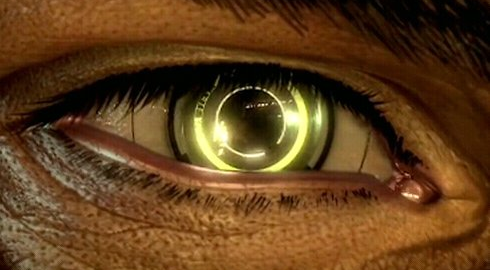
Welcome to a sort of new GamerSushi! And as the title says: don’t worry, your eyes are just fine. Things are, in fact, slightly different than they were before. This update is a bit more subtle than the last one, but it brings with it some section changes that we’re rather excited about.
Reviews
Yes, the reviews section has been up for quite some time, but we’ve changed the way we assess games, yet again. You’ll notice that many of our grades have been shifted to reflect our new Grade Chart. The new chart makes a much better attempt at using the entire grading scale, one that’s more suitable to the games that people actually play. We noticed our reviews kept skewing higher and higher, and we wanted to remedy it.
Beyond that, the most notable addition would be the “A/S Nomination” designation, wherein games are up for an “S” grade that will be decided on later in the year. If they don’t get the “S”, they still keep the nomination, so to speak. Kind of like how a movie is forever known as an Academy Award nominee.
Waiting for this update has been the primary reason we haven’t put up any new reviews in a few months. Over the next couple of weeks, you’ll see a slew of regular reviews that incorporate this new scale.
GS Rankings
The Rankings page, while still in its early stage, will see lots of shifts over the course of the year. The basic idea is the same concept of a Sports power ranking, where every few weeks we re-rate the top 10 games of the year so you can see what’s in the running for the best of 2012. What’s nice is that over time, sometimes games fade away or haunt you, and this list will capture that. I think it’ll be a nice addition to the site, and will make for some good discussion.
There are some other subtle cosmetic things that Nick did, but that about sums it up for the big shifts. Praise the Beard for his good work. If you like it, that is. And I’m sure you will.
Metacritic Founder to Game Reviewers: Use the Full Scale
One of the things that we try to do differently around here than at other game sites is handle our reviews with care. We do our best not to rush them, we try to tackle them thoughtfully, and really consider our scale when we assign grades. This hasn’t always worked out perfectly, and sometimes I still question the way we handle this, but I think we do a decent job. Other game reviewers? No comment.
Metacritic founder Marc Doyle, however, has some choice comments of his own. Talking with GamePro, Doyle expressed his opinion that game reviewers, quite frankly, need to play more crap. He believes that the sliding scale of game reviews to higher ranges is in part due to reviewers not playing truly bad games often enough.
Below-average games are not being reviewed as often as they once were and, partly as a result, critics have not honed their skills at assigning scores from the lower end of their grading scales. The question of exactly how bad a game has to be to merit a 1 score instead of 2 on the 10 point scale, for example, is not being contemplated with as much experience, care and precision as the 8 versus 9 consideration.
Later he goes on to talk about how the film industry is used to these bad scores, and knows how to adapt itself to them. He believes that playing bad games would help reviewers at their trade more, and would benefit the industry as a result.
So what do you guys think about this? In my mind, this could easily be a chicken vs egg argument. Have reviewers done this because of Metacritic, or did Metacritic come about because of this trend in reviews? Or is it the publishers who have put too much pressure on reviewers? Who exactly is to blame for this strange relationship? Go!
Source – GamePro
How to Write a Video Game Review
 The wide world of video game reviews is a tricky business, one that we here at GamerSushi have not figured out. Clearly, we are doing something wrong when it comes to how we handle the beloved AAA franchises upon release, because we aren’t making buttloads of money and getting free video games. Perhaps it’s because we don’t give everything the standard 9.0 that seems to come along with being labeled a credible outlet. We will not name names, though.
The wide world of video game reviews is a tricky business, one that we here at GamerSushi have not figured out. Clearly, we are doing something wrong when it comes to how we handle the beloved AAA franchises upon release, because we aren’t making buttloads of money and getting free video games. Perhaps it’s because we don’t give everything the standard 9.0 that seems to come along with being labeled a credible outlet. We will not name names, though.
Anyway, we thought we’d create a list of helpful tips for how to write a video game review, the industry way. And before you ask- yes, this post is for the lulz, as they say in some Eastern European countries.
So here it is. How to write a video game review: Continue reading How to Write a Video Game Review
Tell Us We’re Wrong: Re-Rate Our Reviews
 Normally you guys are pretty accepting of our review scores; there’s some mumbling and grumbling when we rate things a little too high or low, but it’s usually pretty mellow. I know under all that patience is a bubbling crock-pot of hate, ready to come bursting from your finger tips like magma from a volcano. This is the opportunity for you, the GamerSushi community, to give your opinion and re-rate our reviews.
Normally you guys are pretty accepting of our review scores; there’s some mumbling and grumbling when we rate things a little too high or low, but it’s usually pretty mellow. I know under all that patience is a bubbling crock-pot of hate, ready to come bursting from your finger tips like magma from a volcano. This is the opportunity for you, the GamerSushi community, to give your opinion and re-rate our reviews.
We’ve been talking internally about changing around some scores for a while now, and, as Eddy mentioned on the podcast, the further we get into a given year the more some titles stand out or fade away. For example, I kind of want to change Alan Wake to a B and bump Red Dead Redemption up to an S. Alan Wake sort of fell apart in the last bit and didn’t have that much content compared to this year’s other big A games. Conversely, Red Dead offered so much and was a fantastic looking engaging game. As time has gone by, I’ve forgiven the control and ending issues I had, and I’m kind of regretting my score.
So, we pose the question to you guys: which review scores would you change? Remember to give your reasons, and we’ll take this into consideration in the future. Go!
Update: GamerSushi Grade Chart
Along with the fresh coat of paint for the site, you may have noticed a few other updates around the house as well. One of those is an update to ye olde GamerSushi grade chart, which explains the way our review system works, and gives a few examples of where games tend to fall on the scale. It’s mostly the same in terms of content, but with a few extra details to help distinguish between the grades. Nick did a killer job of it, and I’m kind of in love with it.
We’ve been kicking around our grade system a little bit lately, and we’re of the belief that over the course of time we’ll continue to make tweaks and find better ways to look at games. I really like the way we do it right now, and I think the new grade chart is a nice refinement.
Anyway, take a look at it after the jump or head over to the grade chart page. Continue reading Update: GamerSushi Grade Chart
GamerSushi Grade Chart Part Deux
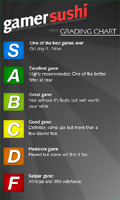 A month back or so, we asked for your input on how our grading scale worked for the games we review here at GamerSushi. You all weighted in with you thoughts, and gave some really valuable input that helped us in our discussions about how we should address our grading system going forward. Seriously, it really pointed us in the right direction. So, it is with great pleasure that we introduce to you the brand new version of the grade chart.
A month back or so, we asked for your input on how our grading scale worked for the games we review here at GamerSushi. You all weighted in with you thoughts, and gave some really valuable input that helped us in our discussions about how we should address our grading system going forward. Seriously, it really pointed us in the right direction. So, it is with great pleasure that we introduce to you the brand new version of the grade chart.
We’ve created a new page that has a breakdown (written by Anthony) of how the updated grading scale works. We basically combined several ideas that people gave us.
Our problem before was that since we are a small site with limited resources beyond our own wits (and even that isn’t much), there’s no way we’re going to be reviewing games that are truly worthy of D’s or F’s. Even C’s for that matter. All of our scores ended up being in the same zone for this reason, because half of our scale was useless.
What we’ve done now is address that issue by re-scaling the chart so that it basically only takes into account the hyped or AAA titles. That means that even a D could still be a good game, just a blockbuster title we didn’t enjoy as much as others. On top of all that, we ditched the +/- system, and added a new grade of “S” for the truly special games. This took care of the issues we were having where a game like Resident Evil 5 deserved an A+, but on our old scale, that would mean it was one of the “greatest games of all time”, along with Uncharted 2. In our new scale, RE5 becomes an A and Uncharted 2 becomes an S.
Anywho, Anthony explains all of that much better on the new grade chart page. I’d suggest checking it out and leaving your thoughts here! We’ll be re-scoring all of our reviews over the next weekend, so tell us your thoughts on those, too.
EDIT: Nick made the sweet graphic of the grade chart. He yelled at me for not telling you guys that. Whoops. NICK MADE IT.
GamerSushi Asks: On Reviews?
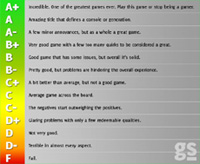 One of the things we strive for here at GamerSushi is to include you guys and keep this as democratic as possible (within reason of course) in order to make this an awesome community. As you all know, one of the things we do here is review games, most often the bigger titles that are hitting the market.
One of the things we strive for here at GamerSushi is to include you guys and keep this as democratic as possible (within reason of course) in order to make this an awesome community. As you all know, one of the things we do here is review games, most often the bigger titles that are hitting the market.
So, in regards to our reviews, I have a few questions. The first one: what do you guys think of our rubric? While it used to please us, lately we’ve been having some issues with it. For instance, a few months back, I gave Resident Evil 5 an A instead of an A+ simply because by our rubric, it wasn’t “one of the greatest games of all time”. However, looking back, I still desperately want to give it an A+, rubric be damned.
That’s just one small example out of the many, but I think something about our rubric is what’s making most of our game scores fall in the B+ to A range. I’d like to fix this however possible, and we’re open to suggestions from you guys. I’m convinced that letter grades are the best thing to do, but I’m ready to hear out other thoughts.
Second question: what do you guys think of us going back and permanently adjusting review scores? I know that in some communities, the site gets vilified for changing scores, but personally, I think that more sites ought to go back and re-evaluate games months after the fact. Off the top of my head, I think that I scored Gears of War 2, Left 4 Dead and Metal Gear Solid 4 all far too high, and would like to change them.
So, tell us your thoughts on those. We’re gearing up for some changes around here (hence the less frequent posts over the last few weeks), so there will be more of these kinds of questions coming. Go!
GamerSushi Asks: Suggested Reviews?
Hello fellow gamers. Got a question for you dudes.
Recently, someone brought up on a review that we only tend to review blockbuster titles that almost always get the same kind of scores. While it must be noted that we are just some regular guys that aren’t going to waste our time with games that will get lower scores, we do feel that this was a solid issue worth discussing at a later time.
To be honest, we don’t always think about all of our options available to us for reviews. So we wanted to ask you guys and get some opinions- what other games do you want to see reviewed, besides some of the bigger titles like Uncharted 2, Forza 3, etc? Feel free to suggest anything that you’ve been wanting to know more about. We can’t promise that we’ll get to all of them, but we’ll definitely broaden our horizons and try to hit on some upcoming games that you guys are curious about. Fire away!
GamerSushi Reviews: Quick Hits
 We play lots of games here around GamerSushi. So many, in fact, that there’s not possibly time to write reviews for all of them. While we would love to give some in-depth analysis of every title that graces our screens, we just don’t always get a chance to.
We play lots of games here around GamerSushi. So many, in fact, that there’s not possibly time to write reviews for all of them. While we would love to give some in-depth analysis of every title that graces our screens, we just don’t always get a chance to.
So, rather than neglect this bunch of titles, and make way for the deluge of blockbuster games that are about to appear on the queue, Mitch, Anthony and I decided to give you guys a new feature called Quick Hits.
What are Quick Hits? Quick Hits are fast and to-the-point reviews of several titles we’ve played recently, machine gunner style. Feel free to discuss the games at article’s end, and let us know what you think of them.
Continue reading GamerSushi Reviews: Quick Hits
The Upward Trend In Video Game Reviews
 When I was younger, reading a video game review in a new magazine or on a Web site was one of the most exciting experiences I could have as a gamer. To finally find out if the game I had been waiting for was worth playing was a moment of fear, excitement and trepidation. However, most of the joy has left this ritual in the last generation. Why is that? Because I already know that the score is going to be about 7.5 or above. It’s set in stone.
When I was younger, reading a video game review in a new magazine or on a Web site was one of the most exciting experiences I could have as a gamer. To finally find out if the game I had been waiting for was worth playing was a moment of fear, excitement and trepidation. However, most of the joy has left this ritual in the last generation. Why is that? Because I already know that the score is going to be about 7.5 or above. It’s set in stone.
You see, these days, our perception on good video game reviews has changed. While the scale is supposed to theoretically range anywhere from 0 to 10, most often, the scale seems to start at about 7.5-8. As a result, what used to be a good score for a video game has changed, and expectations are through the roof for every AAA title. The real question is this: when did an 8.5 become a “meh” score in gamers’ minds?
Continue reading The Upward Trend In Video Game Reviews
The GamerSushi Grading Rubric
As you know, we’ve started to review games here on GamerSushi. Every now and then, we’re looking to post some of our thoughts about the games we’ve beaten, and then rating them based on our experiences. Hopefully, you’ll find this to be a well thought out feature that we do, and trust us, a lot of thought has gone into the process.
Here’s a handy chart that will let you know what we mean by our letter grades of games. Props to our bud Nick (the great bearded one) for coming up with this. I kind of heart it alot. Click on the thumbnail to view it.
Let us know what you think!
GamerSushi Asks: Game Reviews
 There’s an ongoing discussion around gaming media and the industry these days about the nature of gaming reviews, and whether or not they’re broken in their current state. We here at GamerSushi have been in a lengthy (pages of Facebook threads) discussion about what exactly makes a good game review.
There’s an ongoing discussion around gaming media and the industry these days about the nature of gaming reviews, and whether or not they’re broken in their current state. We here at GamerSushi have been in a lengthy (pages of Facebook threads) discussion about what exactly makes a good game review.
Is it a percentage, a score out of 10, a letter grade, a thumbs up, or some other way of attributing a tangible rating to a product, like gold stars or smiley face stickers? Poop?
Spore Not Perfect, Internet Poops Bricks
 Sometimes, the Internet’s view of game reviews really just drives me crazy. And not just normal crazy, but bat-crap-freaking-loco. Take this news, for instance, that Spore is getting less than stellar reviews out of Europe. In fact, some media outlets like German mag PC Games are going as low as an appalling score of 73%. Out of 100, even!
Sometimes, the Internet’s view of game reviews really just drives me crazy. And not just normal crazy, but bat-crap-freaking-loco. Take this news, for instance, that Spore is getting less than stellar reviews out of Europe. In fact, some media outlets like German mag PC Games are going as low as an appalling score of 73%. Out of 100, even!
The sky isn’t just falling. Bitch done collapsed.


